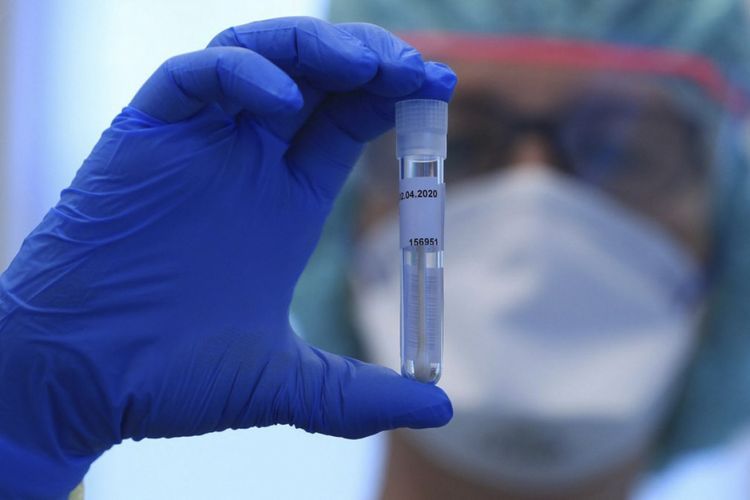Clinical trials of the first combined vaccine of Russia's Sputnik V and the British Oxford–AstraZeneca will be conducted in Azerbaijan, following permission granted by the Healthcare Ministry of Azerbaijan on February 8.
In its statement issued on Monday, the ministry claimed that the clinical studies of AZD1222, co-invented by Oxford University and AstraZeneca, a British-Swedish multinational pharmaceutical and biopharmaceutical company, in combination with Sputnik V, developed by the Russian Gamaleya Research institute, will begin before the end of February.
"In the course of the studies, it is planned to evaluate the immunogenicity and safety of the combined use of the Sputnik V vaccine and the vaccine developed by AstraZeneca in cooperation with Oxford University," the statement reads. "The study program will last 6 months in several countries, and it is planned to involve 100 volunteers in each study program."
The UK and Russian scientists are teaming up to trial a combination of the Oxford-AstraZeneca and Sputnik V vaccines to see if a combination of the two coronavirus vaccines is to help in generating wider protection through a stronger immune response and better accessibility.
"R-Pharm has been actively working with the Republic of Azerbaijan for several years, we opened a modern production facility here in 2019, later in 2020 we registered two drugs from our anti-Covid portfolio: Artlegia and Coronavir," Alexey Repik, Chairman of the Board of Directors of R-Pharm, said on Tuesday. "This pilot study is vital for developing a new approach to the prevention of Covid-19, moreover the leading scientific and clinical centers of Azerbaijan will be able to make their own important contribution in this direction."
The decision to combine two coronavirus vaccines came at a time when AZD1222 showed 62% efficacy in preventing Covid-19 disease in participants given two full shots of the vaccine. Russia's Gamaleya center invited researchers from the University of Oxford to add a component of its vaccine to an only component of AstraZeneca's, as the study had shown insignificant improvement in immunity after using the first component for a second time.
According to the vaccine developers, both the Oxford and the Sputnik V jabs use harmless viruses as a carrier to deliver a small fragment of the coronavirus to the body. While the Russian Sputnik V vaccine uses the unique technology of combining two different vectors based on human adenovirus, the Oxford-AstraZeneca's AZD1222 vaccine is based on a replication-deficient chimpanzee viral vector.
Britain’s AstraZeneca, Russia’s Gamaleya Institute, the Russian Direct Investment Fund and R-Pharm signed a memorandum of intent on cooperation in vaccine development, which was announced in December 2020 during a meeting with Russian President Vladimir Putin.
Sputnik V was registered on August 11, becoming the first registered vaccine against Covid-19 in the world. Russia's first vaccine was named after the world's first satellite launched in 1957 by the Soviet Union during the space race. The vaccine is administered in two doses, with the two jabs to be administered three weeks apart. It is now being offered to Russians as part of a mass vaccination campaign.
The vaccine is one of the three vaccines in the world that demonstrated an efficacy rate above 90% at each of the three control points of the trials. In addition, it demonstrated 100% efficacy against severe Covid-19 cases.
The deadly virus, which was first identified in Wuhan, the capital of China’s Hubei province, in December, has exponentially spread around the globe. According to an interactive map from Johns Hopkins Center for Systems Science and Engineering, the number of global coronavirus cases has reached the grim milestones of 107 million cases and over 2.3 million deaths.







 Russian peacekeeping forces, deployed in the Karabakh (Garabagh) region of Azerbaijan since 2020, have commenced their withdrawal from the area.
Russian peacekeeping forces, deployed in the Karabakh (Garabagh) region of Azerbaijan since 2020, have commenced their withdrawal from the area.
 Azerbaijan officially unveiled the logo for the upcoming 29th session of the Conference of the Parties to the United Nations Framework Convention o...
Azerbaijan officially unveiled the logo for the upcoming 29th session of the Conference of the Parties to the United Nations Framework Convention o...
 The Kazakh authorities have increased their arbitration claims against international oil companies involved in the development of the Kashagan oil ...
The Kazakh authorities have increased their arbitration claims against international oil companies involved in the development of the Kashagan oil ...



